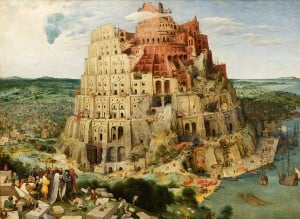Education is slow work. It resists quick conclusions, bumper stickers, facile politicization, sound bytes– in a word, just about everything that fuels cyberknowledge. Cyberknowledge–this is a word I just thought of– is the facsimile of knowing that too frequently happens online. It is what happens when the latest datum fits into a prefabricated way of looking at the world.
What makes it a facsimile of knowing? The fact that it seems to provide an “aha!” moment. But that moment does not follow the pattern of real knowledge. Real knowledge (I am borrowing Newman’s term here) begins with questions, not assertions; it arises from wonder, not certainty.
[Y]ou hear of practised travellers, when they first come into a place, mounting some high hill or church tower, by way of reconnoitring its neighbourhood. In like manner, you must be above your knowledge, not under it, or it will oppress you; and the more you have of it, the greater will be the load. (The Idea of a University, Discourse 6).
One of the important disciplines one must learn at a college or university is the slow work of learning, of distinguishing between real and false knowing. It may well be that what you read on the Internet or on a digital device is frequently leading you to false knowing.
Andrew Sullivan, one of the architects of the phenomenon of blogging (I don’t know whether to thank him or curse him), points to the limitations of this medium in a farewell address to readers:
I’m a human being before I am a writer; and a writer before I am a blogger, and although it’s been a joy and a privilege to have helped pioneer a genuinely new form of writing, I yearn for other, older forms. I want to read again, slowly, carefully. I want to absorb a difficult book and walk around in my own thoughts with it for a while. I want to have an idea and let it slowly take shape, rather than be instantly blogged. I want to write long essays that can answer more deeply and subtly the many questions that the Dish years have presented to me. I want to write a book.
I like his phrase “walk around in my own thoughts.” It’s what I encourage in my Capstone class: the opportunity to slow down, to revisit the process of learning, to have the freedom to name dead-ends in knowing and go back to where real knowing happens. This all takes time.
May I suggest a Lenten discipline rooted in the Christian spiritual tradition? Choose a paper book and practice lectio divina. It can be with a Biblical text or another reflection on how to live the Christian life. Slow down and learn what it is to develop real knowledge of God. Perhaps that discipline may even spill over into a desire for real knowledge of the world he has made.











